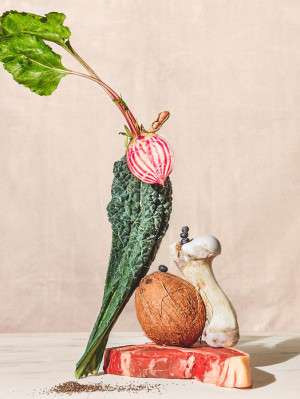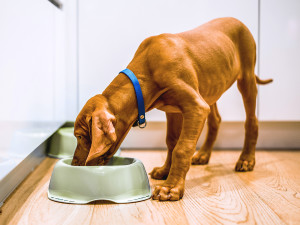Nutritionist Dave Coast Digs Into Grain-Free Dog Food and Heart Disease
The LA wellness guru talks to a holistic veterinarian about the best diet for dogs with allergies and why grain-free food gets a bad rap.

Share Article
Dog food trends follow food trends in the human world. So, in the early 2010s when the “paleo diet” exploded into the mainstream, it was only a matter of time before it made its way to dog food. A paleo diet typically includes lean meats, fish, fruits, vegetables, nuts, and seeds — foods that in the past could be obtained by hunting and gathering. And it limits foods that became common when farming emerged about 10,000 years ago: dairy products, legumes, and grains.
By 2016, the year I got Stanley, grain-free dog food was all the rage. Marketed as the “wild” and “more natural” alternative to traditional dog food, it felt like the obvious choice at the time. And since I was working as a nutritionist myself, I made sure to read the food labels thoroughly. I finally landed on a kibble for which the first ingredient was real meat, and it also included antioxidant-rich fruits and vegetables, not to mention probiotics and Omega-3s. I would occasionally try to switch Stanley to a kibble alternative, like freeze-dried dog food or human-grade dog food. But he never liked them, and they were expensive AF. It started to feel like a waste of money, and since he was happy with his grain-free kibble, I gave up my search for alternatives. Until recently…
I was at the vet for Stanley’s annual check-up and got scolded by the veterinarian for feeding him grain-free dog food. While I had recently heard about some studies that suggested dogs eating grain-free food were experiencing heart disease at a higher rate, I assumed some other factors were at play (exercise, food quality).
The vet said that while they don’t know exactly why grain-free food has been speculated to cause problems, it likely had to do with the fact that dogs have evolved tremendously over the last 10,000 years, alongside humans of course, who were eating grains the entire time (agricultural revolution anyone!?). Dogs were being fed human food scraps, so it’s safe to assume that over the last 10,000 years, dogs have also evolved to eat grains as well. Interesting.

That said, I left the vet office more confused than ever. I don’t take switching Stanley’s food lightly, and I did a ton of research, ultimately landing on a human-grade, fridge-free, hassle-free dog food with quinoa (yes, grains!) that doesn’t contain potatoes or peas — two ingredients that may be linked to the grain-free issue. I still occasionally feed Stanley leftover salmon skins and other healthy scraps from the kitchen, like carrots and cucumbers (which he loves because they’re crunchy).
But I’m still left wondering, what’s really the optimal diet for a dog? So, I turned to Dr. Angie Krauseopens in new tab. She is a holistic veterinarian who honors a diverse set of pet care principles — incorporating traditional Chinese medicine, acupuncture, herbal formulas, and personalized diets into her practice.
Do dog probiotics actually work? If so, what are the benefits of adding them to a pet’s diet?
There is a growing body of research supporting the use of probiotics in dogs. Bacteria that lines the gastrointestinal tract of dogs can affect digestive health, immune function, and overall wellbeing. Probiotics can help increase the number of good bacteria and benefit your dog’s health in a variety of ways.
What diet would you recommend for a dog with food allergies?
The best diet for a dog with food allergies is a balanced diet free of Allergan (or whatever ingredient is triggering your dog’s allergies). For dogs with one to two allergies, this can be easily attainable. For dogs with many allergies, a hydrolyzed diet may be the best option.
There’s a big fuss about grain-free dog food being bad for heart health. What’s going on? Do dogs need grain, or is something else about that type of food causing heart issues?
When the pet food industry started mirroring the paleo fad in human diets, they eliminated grains in dog foods. In order to keep kibble crunchy, these ingredients were replaced with large amounts of legumes, like peas and lentils. This ingredient swap has been speculated to cause the nutritional deficiency related to a heart condition in dogs.
Golden Retrievers seem to be more prone to develop this heart condition. However, reports of other breeds of dogs that are not genetically prone to this heart disease have been on the rise as well. It’s hypothesized that the large amount of legumes in the diet block the absorption or production of certain amino acids. This causes a heart disease that can sometimes be reversed with supplementation of taurineopens in new tab, along with a change in diet. In summary, the fuss is less about grains and more about the presence of legumes in a dog’s diet. I go into more detail opens in new tab on grain-free foods on my blog.
My vet told me that game meat is more problematic for a dog’s digestion than chicken or beef. Is that true, and if so, why is that (I would think descendants from wolves would be built for eating game meat)?
I have not heard this or experienced this in practice. Venison is often used as a novel protein for dogs with food allergies.
I was also told that protein size could have an effect on food allergies. What does that mean?
Think of proteins like a pearl necklace. Each pearl is an amino acidopens in new tab. The longer the chain of amino acids, the bigger the protein. Bigger proteins are more likely to cause an immune reaction. With hydrolyzed diets, the amino acids are cut into smaller sequences making them less allergenic.
Editor’s Note: Plant-based dietsopens in new tab for dogs are increasingly popular. Stay tuned for an upcoming feature about the vegan, sustainable pet food world.

Dave Coast
Dave Coast is a Registered Holistic Nutritionist and Digital Creator living with his partner and dog, Stanley, in Los Angeles, CA. He founded www.thehealthycamper.comopens in new tab to create a wellness destination for the mind, body, spirit, and planet. His work has been featured in GQopens in new tab, OUTopens in new tab, Mother Jonesopens in new tab, VeryWellopens in new tab, Apartment Therapyopens in new tab and Outsideopens in new tab magazines. He regularly creates content about nutrition, fitness, healthy living, men’s grooming, LGBT relationships, and sustainability. Watch his new IGTV series, Wellness Myth Bustersopens in new tab on Instagram.





